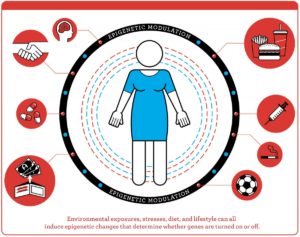
The Surprising Connections Between Disease and Longevity

The Surprising Connections Between Disease and Longevity
 One of the newest disciplines in both the field of genetics and science in general is epigenetics. This is a modern discipline that studies how environmental exposure can influence the expression or suppression of specific genes without altering the DNA of the individual. Essentially, through the understanding of epigenetics, two people with the exact same DNA, such as identical twins, can manifest their genes differently based on differing experiences and environment. DNA Methylation, or the binding of a methyl group to a specific gene, acts as a switch, effectively suppressing the target gene without removing it from the genome. Another form of epigenetics is the effective removal of methyl groups from genes in order to express them. Both of these scenarios can be beneficial depending on what gene is being targeted. These acquired traits are then able to be inherited by offspring. Most of the initial studies that led to the concept of epigenetics focused on maternal effect, or the methylation within a fetus being determined by the decisions and environment of it’s mother. Maternal effect has more recently been linked to the ever increasing rate of childhood obesity. The thrifty phenotype hypothesis predicts that when a pregnant mother eats a diet rich in fats but lacking in nutritional value (such as a diet of primarily fast food), their fetus thinks it is being born into an environment lacking nutrients. Consequently, the fetus undergoes methylation that results in a “thrifty” metabolism which is better equipped at storing energy. If this were to occur during a time of actual famine, the fetus would be better able to survive. In the modern world, where food is readily available, when a baby is born with a “thrifty” metabolism it results in obesity. This is just one example of epigenetics at work. Make no mistake, gene suppression and expressions via methylation is occurring frequently in individuals throughout their life times. This is still such a new concept and area of study. Much more research must be done on the matter in order to truly understand how our environment and items we ingest are affecting us. Dr. Moalem suggests that this will be a promising area for treatment options in the future of medicine.
One of the newest disciplines in both the field of genetics and science in general is epigenetics. This is a modern discipline that studies how environmental exposure can influence the expression or suppression of specific genes without altering the DNA of the individual. Essentially, through the understanding of epigenetics, two people with the exact same DNA, such as identical twins, can manifest their genes differently based on differing experiences and environment. DNA Methylation, or the binding of a methyl group to a specific gene, acts as a switch, effectively suppressing the target gene without removing it from the genome. Another form of epigenetics is the effective removal of methyl groups from genes in order to express them. Both of these scenarios can be beneficial depending on what gene is being targeted. These acquired traits are then able to be inherited by offspring. Most of the initial studies that led to the concept of epigenetics focused on maternal effect, or the methylation within a fetus being determined by the decisions and environment of it’s mother. Maternal effect has more recently been linked to the ever increasing rate of childhood obesity. The thrifty phenotype hypothesis predicts that when a pregnant mother eats a diet rich in fats but lacking in nutritional value (such as a diet of primarily fast food), their fetus thinks it is being born into an environment lacking nutrients. Consequently, the fetus undergoes methylation that results in a “thrifty” metabolism which is better equipped at storing energy. If this were to occur during a time of actual famine, the fetus would be better able to survive. In the modern world, where food is readily available, when a baby is born with a “thrifty” metabolism it results in obesity. This is just one example of epigenetics at work. Make no mistake, gene suppression and expressions via methylation is occurring frequently in individuals throughout their life times. This is still such a new concept and area of study. Much more research must be done on the matter in order to truly understand how our environment and items we ingest are affecting us. Dr. Moalem suggests that this will be a promising area for treatment options in the future of medicine.